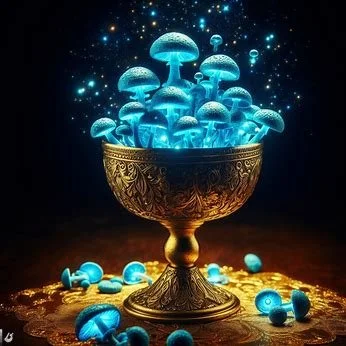Denver's Psychedelic Cup Signals Growing Acceptance of Magic Mushrooms
The cannabis-inspired event featured educational talks, vendors hawking trippy art and accessories, and a competition for the best psilocybin fungi.
The Psychedelic Cup coincided with the three-year anniversary of Denver's historic vote to decriminalize natural psychedelics like psilocybin and DMT.
While still illegal federally, this local policy shift signified rising openness to once-taboo psychedelic substances.
Normalizing the Trip: Pop Culture, Microdosing Help Destigmatize Psychedelics
From Denver to Silicon Valley, magic mushrooms are shedding their reputation as purely illicit party drugs.
Pop culture has helped rebrand psychedelics in a more positive light. Recent TV shows like Hulu's The Great and HBO's Los Espookys depict shrooms as creative aids instead of dangerous substances.
The concept of microdosing tiny amounts of psychedelics has also gone mainstream. Devotees claim regular microdoses enhance productivity, creativity, and well-being. Author Ayelet Waldman chronicled how microdosing LSD alleviated her depression in A Really Good Day.
This reframing sets the stage for greater exploration of clinical applications down the line.
Retreats Offer Guided Psychedelic Journeys in Legal Gray Area
While recreational use remains illegal, psychedelic retreats operate in a legal loophole to facilitate therapeutic experiences.
At sites like MycoMeditations in Jamaica or Synthesis in the Netherlands, participants ingest psilocybin, LSD, or other psychedelics in guided group settings aimed at psychological healing and personal growth.
These retreats view psychedelics as transformative medicines rather than party toys. Their prominence highlights a desire for meaningful engagement with psychedelic plants.
The success of underground psychedelic programs could inform policy on legal regulated usage. Retreats lay groundwork for a future above-board wellness industry.
From Denver to Oregon, Reform Momentum Builds for Psilocybin
Denver's step toward decriminalization presaged a psychedelic policy revolution across the country.
In November 2020, Oregon passed a historic ballot measure legalizing psilocybin for therapeutic purposes. The law opens the door to licensed "psilocybin service centers" where clients can consume mushrooms under supervision.
California, Colorado, and other states are mulling bills to legalize psilocybin and fund research on its medical utility. Canada also recently granted some patients legal access to psychedelic-assisted psychotherapy.
Novamind CEO Yaron Confortti told Forbes, "We're at the very beginning of the psychedelic renaissance."
An Ethical Roadmap for Psychedelic Medicine
As psychedelics gain legitimacy, experts stress the need to prevent commodification of traditional plant medicines.
Policies should ensure affordable access for therapeutic use. Native American groups and other stakeholders must be included to establish appropriate regulations.
There is also still much to learn about psychedelics' effects and risks. Caution is warranted along with an open but critical mindset.
While promising, psychedelics require an ethical approach as they transition from counterculture to mainstream.
Conclusion: From Taboo to Therapy, Psychedelics Chart a New Course
Events like Denver's Psychedelic Cup reflect rising curiosity around psychedelic mushrooms. Savvy entrepreneurs are anxious to capitalize if legal markets emerge.
Yet psychedelics' full socio-cultural integration will take time and informed policymaking. With careful stewardship, their stigmatized image could give way to life-changing therapies.

